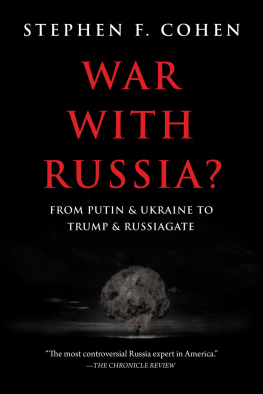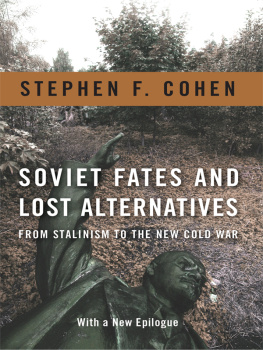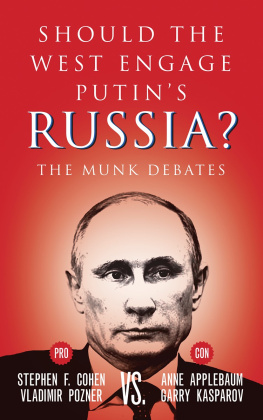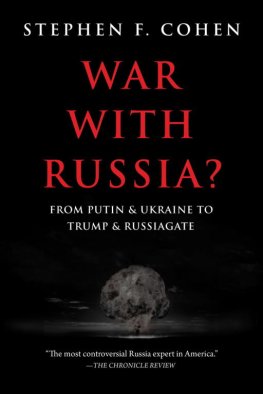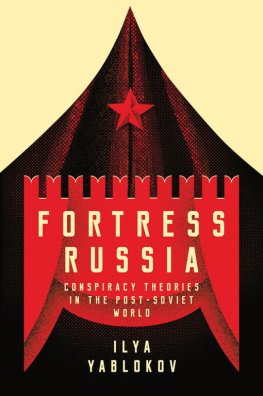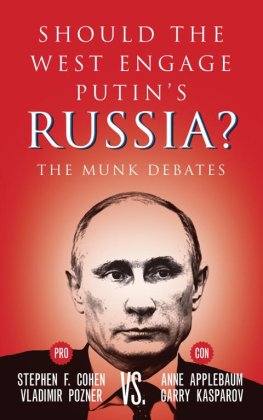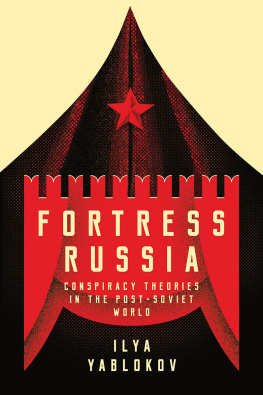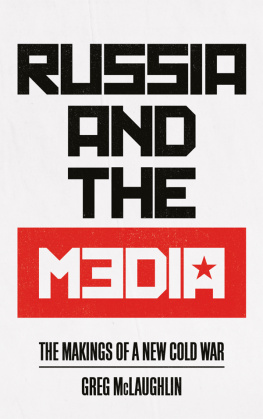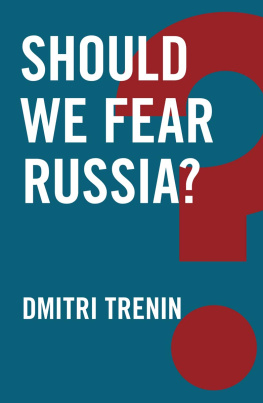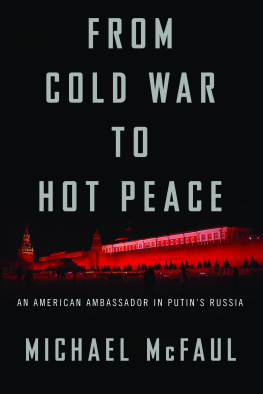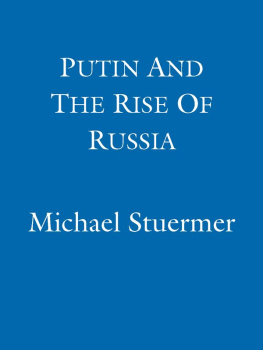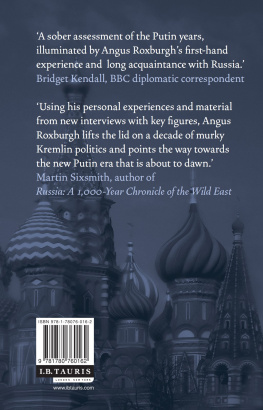Other Books by Stephen F. Cohen
The Great Purge Trial (Co-Editor)
Bukharin and the Bolshevik Revolution: A Political Biography
The Soviet Union Since Stalin (Co-Editor)
An End to Silence: Uncensored Opinion in the Soviet Union (Editor)
Rethinking the Soviet Experience: Politics and History Since 1917
Sovieticus: American Perceptions and Soviet Realities
Voices of Glasnost: Interviews With Gorbachevs Reformers (With Katrina vanden Heuvel)
Failed Crusade: America and the Tragedy of Post-Communist Russia
Soviet Fates and Lost Alternatives: From Stalinism to the New Cold War
The Victims Return: Survivors of the Gulag After Stalin
Copyright 2019 by Stephen F. Cohen
All rights reserved. No part of this book may be reproduced in any manner without the express written consent of the publisher, except in the case of brief excerpts in critical reviews or articles. All inquiries should be addressed to Skyhorse Publishing, 307 West 36th Street, 11th Floor, New York, NY 10018.
Hot Books may be purchased in bulk at special discounts for sales promotion, corporate gifts, fund-raising, or educational purposes. Special editions can also be created to specifications. For details, contact the Special Sales Department, Skyhorse Publishing, 307 West 36th Street, 11th Floor, New York, NY 10018 or .
Hot Books and Skyhorse Publishing are registered trademarks of Skyhorse Publishing, Inc., a Delaware corporation.
Visit our website at www.hotbookspress.com.
10 9 8 7 6 5 4 3 2 1
Library of Congress Cataloging-in-Publication Data is available on file.
ISBN: 978-1-5107-4581-0
eBook: 978-1-5107-4582-7
Cover design by Brian Peterson
Printed in the United States of America
With loving gratitude to Katrina, who, while not fully agreeing with the contents and enduring some slings and arrows, made this book possible.
Table of Contents
To My Readers
T HIS BOOK IS UNLIKE OTHERS I have published. Above all, it evolved during the years since 2014 when US-Russian relations were becoming more dangerous than they had ever beenand then made even worse by the allegations known as Russiagate. How this happened and what these unprecedented realities mean are ongoing themes in the pages that follow.
War With Russia? is also different in another respect. Over the years, I have written several kinds of books for other scholars and general readersbiography, narrative and interpretive political history, collections of essays and columns. The contents of this volume, however, were not originally intended to be a book. Nor were the words initially written. They began as radio broadcasts.
In 2014, the host of The John Batchelor Show , a popular nation-wide news program based at WABC AM in New York City, offered me a weekly segment on Tuesdays at 10 pm for one hourabout 40 minutes of discussion apart from commercial breaks. I had previously known John, a novelist and historian, and considered him to be one of the most erudite, intellectual, and, despite his formal role as a conservative, ecumenical hosts in American talk radio. I accepted.
There was an equally important consideration. I had been arguing for yearsvery much against the American political-media grainthat a new US-Russian Cold War was unfolding, driven primarily by politics in Washington, not in Moscow. For this perspective, I had been largely excluded from influential print, broadcast, and cable outlets where I had previously been welcomed.
Virtually alone among major US media figures, John Batchelorwhose show has some 2.7 million listeners a week across the United States as well as 5 million downloaded podcasts a month here and abroadevidently agreed with my general perspective, or at least thought it important enough to follow. The New US-Russian Cold War became, and remains, the rubric of our broadcasts, though subjects sometimes range more widely.
Our procedure changed over the years. Initially, John and I broadcast live, but due to our schedules began taping the nights discussion around 7 pm, when we already had the US and Russian news of the day. From the beginning, the podcast was posted the next day on the website (TheNation.com) of The Nation magazine, where I had been a contributor for many years. In 2014-2015, because I was writing articles for the magazine, the podcast was accompanied by only a brief paragraph listing the topics of the broadcast. Beginning in January 2016, as the new Cold War grew more perilous, I began writing longer commentaries expanding on each of my contributions to the Batchelor programI did so very quickly overnight, sometimes with little regard for literary polishand posting them with the podcast.
Inadvertently, I became a weekly web columnist, resuming an experiment in scholarly journalism I had undertaken in the 1980s in a monthly column, Sovieticus, for The Nation . Then and now again, I wanted to provide essential historical context missing in news reports and analysis. Most of the weekly broadcasts and my commentariesJohn and I skipped a few weeks due to holidays or scheduling problems on my partwere done in New York City, but some where I occasionally found myself on Tuesdays, from my hometown in Kentucky to Moscow.
Part I of this book is composed of four abridged articles I wrote for The Nation in 2014 and 2015. All of the articles in the Prologue and sections II, III, and IV are selected from almost 150 of my web columns. Except for the Prologue, written in late 2018, they appear in chronological order as an analytical narrative of ongoing events. The date under each title is the day it was posted at TheNation.com. The commentaries appear here largely as posted, though for the book I polished the language somewhat, added some clarifying information, and combined a few related commentaries into one or two.
I also made some deletions in order to avoid unnecessary repetition. But repetition of large themes and ongoing subjects became unavoidable, indeed necessary, for the purpose of my weekly commentariesand of this book: to make accessible to general readers an alternative, dissenting narrative of what I think are among the most fateful developments of our time. Whether I have succeeded or not is for readers to judge.
Quite a few writers in mainstream publications disliked what I was writing. Their agitated responses were noted in a November 24, 2017 feature article about me in The Chronicle Review , the magazine supplement of The Chronicle of Higher Education. It was subtitled The Most Controversial Russia Expert in America. My scholarly workmy biography of Nikolai Bukharin and essays collected in Rethinking the Soviet Experience and Soviet Fates and Lost Alternatives , for examplehas always been controversial because it has been what scholars term revisionistreconsiderations, based on new research and perspectives, of prevailing interpretations of Soviet and post-Soviet Russian history.
But the controversy surrounding me since 2014, mostly in reaction to the contents of this book, has been differentinspired by usually vacuous, defamatory assaults on me as Putins No. 1 American Apologist, Best Friend, and the like. I never respond specifically to these slurs because they offer no truly substantive criticism of my arguments, only ad hominem attacks. Instead, I argue, as readers will see in the first section, that I am a patriot of American national security, that the orthodox policies my assailants promote are gravely endangering our security, and that therefore weI and others they assailare patriotic heretics. Here too readers can judge.

